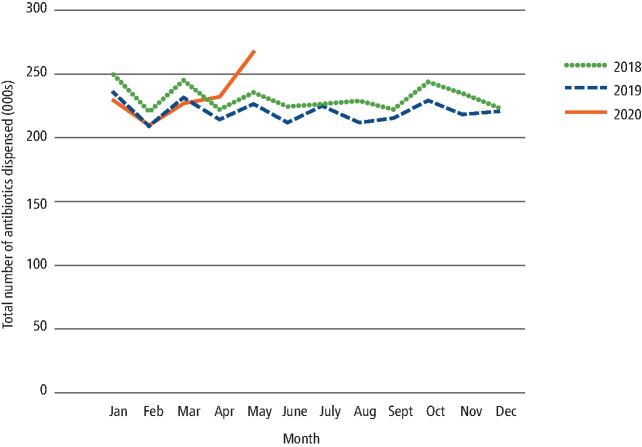Sir, pre-COVID, dentists were responsible for about 10% of all antibiotic prescribing worldwide.1 At the onset of the pandemic most dental practices were restricted to giving advice, analgesia and antibiotics (AAA). Reduced access to dental care and an inability for dentists to provide dental procedures increases dental antibiotic prescribing.2 A large increase in dental antibiotic use in England during April and May 2020 was widely anticipated and so we undertook a rapid analysis comparing antibiotic use across NHS dentistry in England in 2018 and 2019.
The number of antibiotics dispensed each month by community pharmacists in England relating to NHS dental prescription forms from January 2018 to May 2020 is given in Figure 1.3 This shows antibiotic use in May 2020 was a clear outlier compared to the previous 28 months being 18.4% higher than in May 2019 (n = 267,719 and 226,188 respectively).
Fig. 1.
Monthly antibiotic use by NHS dentists from 2018−2020
Interestingly, antibiotic use in April 2020 was slightly higher than the previous April but still within the normal range for the period of study. This is despite the significantly poorer access to dentistry (only around 7,500 patients were seen at designated urgent dental centres [UDCs] across England) compared to May when the capacity of these centres increased and saw over 27,000 patients.4
A range of non-clinical factors are known to be associated with dentists' decision-making about antibiotics prescription for acute conditions.2 Antibiotics may have been used:
As a 'quick fix' to avoid the life-time impact of an unnecessary extraction, in anticipation that AGPs might soon be permissible in general dental practices
Because dentists felt pressured by some patients for antibiotics, irrespective of their efficacy or appropriateness for treating toothache
Because of difficulties diagnosing a patient's condition remotely prompting a 'just in case' approach through concerns of life-threatening deterioration without treatment
As some UDCs were requiring patients to have tried antibiotics before accepting referral for face-to-face care, highlighting system and process impact on antibiotic prescribing.
Finally, the NHS may have seen an influx in patients who might otherwise receive care privately, resulting in an increase in NHS dental prescriptions as, anecdotally, not all practices were open for telephone triage during April and May 2020. Examination of figures for the remainder of 2020 will reveal any enduring impact that COVID interventions may have on dental antibiotic prescribing and in identifying optimisation of future dental antibiotic stewardship.
References
- 1.FDI. Antibiotic Stewardship in Dentistry - FDI Policy Statement: FDI World Dental Federation, 2019.
- 2.Thompson W, Tonkin-Crine S, Pavitt S H et al. Factors associated with prescribing of systemic antibacterial drugs to adult patients in urgent primary health care, especially dentistry. J Antimicrob Chemother 2019; 74: 2139-2152. [DOI] [PMC free article] [PubMed]
- 3.NHSBSA. Personal communication Re: DR1242. 30 July 2020. InformationAnalystTeam@nhs.net.
- 4.Dental Insights Team nhsbsa.dentalinsight@nhs.net 2020. Re: Request for Information [email] W Thompson, wendy.thompson15@nhs.net. 10 August 2020: 08:08hrs.



